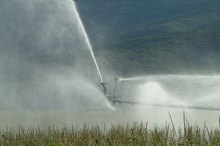The Effects of Wasting Water
Although everyone is aware of the fact that wasting water is bad, many people do not truly understand why. In addition to a higher water bill, leaving a faucet on while brushing teeth, taking long showers and allowing broken sprinklers to leak hundreds of gallons can all have major consequences for the environment. There are several ways water is currently consumed as well as several ways to cut back on this consumption.
Residential Use
The World Health Organization estimates that one out of every six people do not have access to safe drinking water, and approximately 3,900 children die every day due to waterborne illness 2. While residential water use only accounts for about one tenth of the total water consumption, every little bit helps and if everyone were to be conscientious about their water usage, the amount of water saved would be substantial.
Farming
Advantages & Disadvantages for Recycling Water
Learn More
Farming and raising livestock account for 75 percent of water consumption today. People across the world are consuming more meat than ever before and what they may not realize is that it takes as much as 15 times more water to produce a kilogram of beef than it does to produce a kilogram of wheat 2. Add in the ever growing population of the planet and these figures are staggering. Consumers can help lower the overall amount of water used in farming by incorporating more vegetarian meals into their diet and encouraging others to do the same.
- Farming and raising livestock account for 75 percent of water consumption today.
- People across the world are consuming more meat than ever before and what they may not realize is that it takes as much as 15 times more water to produce a kilogram of beef than it does to produce a kilogram of wheat 2.
Climate Change
The climate change itself has contributed to increased water consumption because it causes wetter wet regions and more arid dry regions. Water reservoirs are unable to handle bigger floods of water, and crops and trees often end up wilting or dying when water dries up. Another big water consumer that can be attributed to climate change is that Western governments are subsidizing the growth of crops for biofuel. In 2009, the United Nations estimated that 2 percent of water used for irrigation was used on biofuel crops. With increased demands for these crops, water consumption could increase fourfold.
- The climate change itself has contributed to increased water consumption because it causes wetter wet regions and more arid dry regions.
- In 2009, the United Nations estimated that 2 percent of water used for irrigation was used on biofuel crops.
Industry
What Are Four Sources of Fresh Water?
Learn More
Water is used in many of the steps involved in manufacturing products, from fabrication and processing to washing and transport. Luckily, industrial users are at the forefront of the water conservation movement. Many businesses, such as Coca Cola, are steps ahead of government legislation. The soft-drink giant has promised to cut water consumption by 20 percent by 2012. If consumers and industrialists alike urge farmers to follow this trend, the world will have water for many more decades to come 2.
- Water is used in many of the steps involved in manufacturing products, from fabrication and processing to washing and transport.
- Luckily, industrial users are at the forefront of the water conservation movement.
Related Articles
References
- The Economist; Sin Aqua Non; April 8, 2009
- World Water Council; Water Crisis
- Ohashi Y, Sakai K, Hase H, Joki N. Dry weight targeting: The art and science of conventional hemodialysis. Semin Dial. 2018;31(6):551-556. doi:10.1111/sdi.12721
- Beverages, water, tap, drinking. FoodData Central. U.S. Department of Agriculture. Published April 1, 2019.
- Dietary reference intakes for water, potassium, sodium, chloride, and sulfate. National Academies Press, 2005.
- Jéquier E, Constant F. Water as an essential nutrient: The physiological basis of hydration. Eur J Clin Nutr. 2010;64(2):115-23. doi:10.1038/ejcn.2009.111
- Popkin BM, D'Anci KE, Rosenberg IH. Water, hydration, and health. Nutr Rev. 2010;68(8):439-4358. doi:10.1111/j.1753-4887.2010.00304.x
- Adan A. Cognitive performance and dehydration. J Am Coll Nutr. 2012;31(2):71-8. doi:10.1080/07315724.2012.10720011
- Dennis EA, Dengo AL, Comber DL, et al. Water consumption increases weight loss during a hypocaloric diet intervention in middle-aged and older adults. Obesity (Silver Spring). 2010;18(2):300-307. doi:10.1038/oby.2009.235
- National Institutes of Health Genetic and Rare Diseases Information Center. Aquagenic urticaria. Updated June 20, 2016.
- Centers for Disease Control and Prevention. Well testing. Updated April 10, 2009.
Writer Bio
Jack Powell has been writing professionally since 2008. He graduated from Red River College with a degree in creative communications and currently writes for a variety of local publications.









